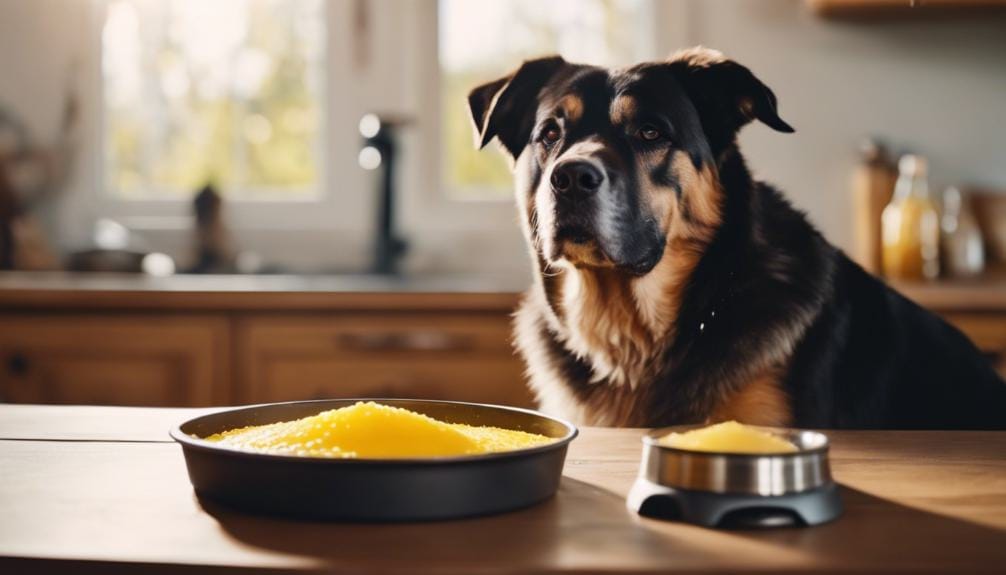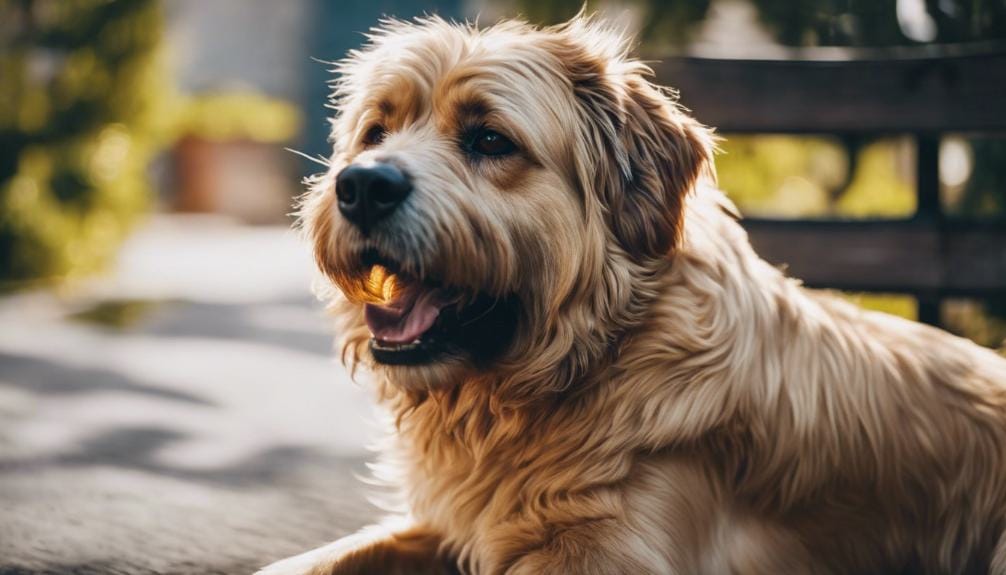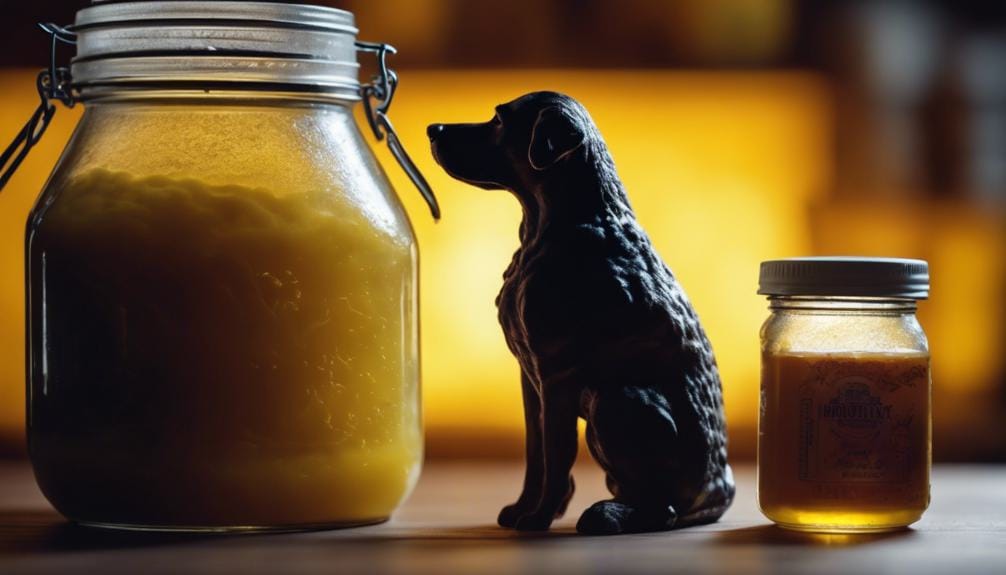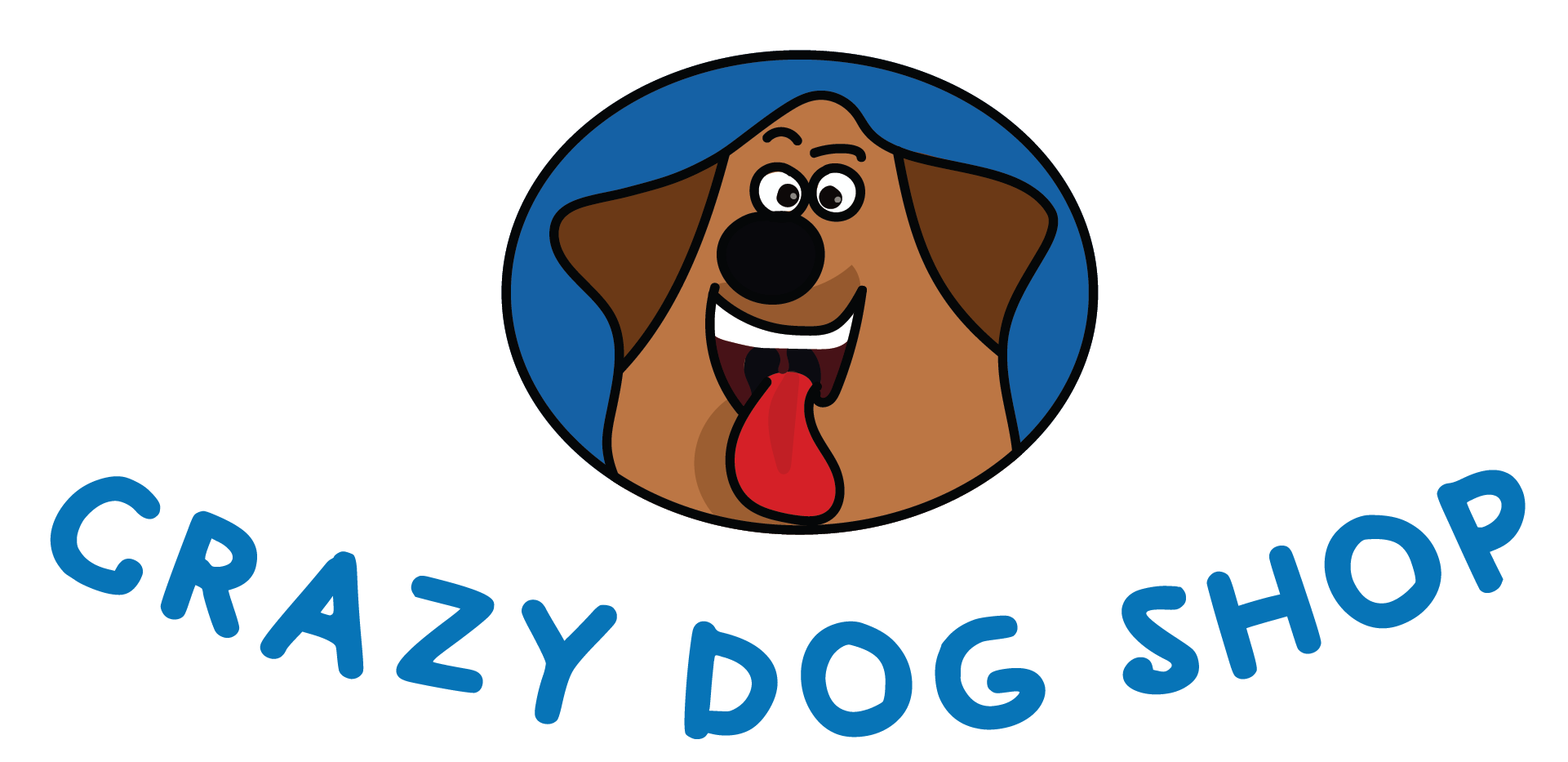Are Ghee Bad for Dogs? Understanding Potential Risks and Benefits
Imagine your canine companion enjoying a bowl of nutritious food, their tail wagging in contentment.
However, before you decide to introduce ghee for dogs into their diet, it’s crucial to understand the potential risks and benefits associated with this clarified butter.
While ghee can offer certain advantages for your furry friend, there are important considerations to keep in mind to ensure their well-being.
From digestive implications to weight management, exploring the impact of ghee on your dog’s health is essential.
Key Takeaways
- Ghee can lead to weight gain and digestive issues in dogs.
- Ghee promotes gut health but can trigger allergic reactions.
- Monitoring ghee intake is crucial to prevent weight-related problems.
- High-fat content in ghee increases the risk of pancreatitis in dogs.
Potential Risks of Feeding Ghee to Dogs
Feeding ghee to dogs poses potential risks that owners should be aware of due to its high-fat content and calorie density. While ghee can be a tasty addition to your dog’s diet, it’s essential to understand the possible adverse effects it may have on their health.
The high-fat content in ghee can lead to weight gain in dogs if consumed excessively. Additionally, this richness can also cause gastrointestinal issues, with pancreatitis being a particular concern for some dogs. Dogs with lactose intolerance may experience digestive issues due to the trace amounts of lactose present in ghee. Furthermore, allergic reactions to cow’s milk proteins can occur in dogs sensitive to dairy products like ghee.
To ensure your dog’s well-being, it’s crucial to monitor their health and behavior closely after introducing ghee into their diet. Any signs of discomfort, digestive disturbances, or allergic reactions should prompt a discussion with your veterinarian. By staying vigilant and observant, you can better assess how your dog responds to ghee and make informed decisions regarding their dietary choices. Remember, each dog is unique, so what works for one may not work for another when it comes to ghee consumption.
Impact of Ghee on Canine Digestive Health

Ghee can positively impact canine digestive health by promoting the production of butyric acid, a substance that supports gut health and aids in nutrient absorption. The anti-inflammatory properties found in ghee, particularly butyric acid, may help alleviate digestive issues and reduce inflammation in dogs, contributing to a healthier digestive system overall. Since ghee is lactose-free and devoid of casein, common allergens in dairy that can lead to digestive problems in dogs, it’s a suitable option for those with sensitivities.
Moderate consumption of ghee can be beneficial for dogs due to its nutrient-rich composition. By incorporating ghee into your dog’s diet in controlled amounts, you can potentially improve their digestive function and contribute to a more balanced diet. This can help in maintaining a healthy digestive system in your canine companion.
When considering ghee for your dog, remember that like any food, moderation is key. While ghee can offer digestive health benefits, it should be part of a well-rounded diet tailored to your dog’s specific needs. Consulting with your veterinarian can help ensure that ghee is a suitable addition to your dog’s diet and that it supports their overall health and well-being.
Understanding Ghee’s Effect on Dog Weight

Excessive consumption of calorie-dense ghee by dogs can contribute to weight gain and potential obesity due to its high fat content and caloric density. Dogs are susceptible to weight gain if they consume ghee excessively, as it’s packed with approximately 120 calories per tablespoon.
Here are some key points to consider regarding ghee’s effect on your dog’s weight:
- High Fat Content: Ghee is rich in fats, which can easily lead to weight gain in dogs if not consumed in moderation.
- Caloric Density: The caloric density of ghee makes it easy for dogs to consume excess calories, potentially resulting in obesity if intake isn’t monitored carefully.
- Monitoring and Prevention: It’s crucial to monitor the amount of ghee your dog consumes to prevent weight-related health issues. Moderation is key to ensuring that your dog’s diet isn’t overloaded with unnecessary calories. By keeping a close eye on your dog’s weight and adjusting their ghee intake accordingly, you can help prevent weight gain and associated problems.
Understanding the impact of ghee on your dog’s weight is essential for maintaining their overall health and well-being. By being mindful of their diet and ensuring that ghee is given in moderation, you can help prevent weight-related issues and keep your furry companion in good shape.
Allergic Reactions to Ghee in Dogs

Cow’s milk proteins present in ghee can trigger allergic reactions in dogs, leading to symptoms such as itching, redness, hives, digestive issues, or respiratory distress. These allergic reactions can range from mild discomfort to severe complications, depending on the dog’s sensitivity and the amount of ghee consumed. It’s crucial for dog owners to be aware of the potential signs of an allergic reaction to ghee and to monitor their pets closely after consumption.
If your dog has known dairy allergies or sensitivities, it’s especially important to be cautious when introducing ghee into their diet. Watch for any signs of itching, red patches on the skin, swelling (hives), upset stomach, vomiting, diarrhea, or difficulty breathing. These could be indicators of an allergic response to the cow’s milk proteins found in ghee.
To determine if your dog may be allergic to ghee, consider conducting a small patch test before incorporating it regularly into their meals. If you suspect that your dog is experiencing an allergic reaction to ghee, seek immediate veterinary advice. Consulting with a professional can help confirm the allergy and provide guidance on managing your dog’s diet to avoid future reactions. Remember, your dog’s health and well-being should always be a top priority when considering dietary changes or additions like ghee.
Ghee and Canine Pancreatitis Risk

With the potential risk of pancreatitis in dogs, especially those prone to the condition, it’s crucial to consider the impact of ghee consumption on their health. Ghee’s high fat content can significantly increase the risk of pancreatitis in dogs due to the inflammation it can cause in the pancreas. Here are three essential points to understand about ghee and canine pancreatitis risk:
- Pancreatitis is a condition characterized by inflammation of the pancreas, which can be triggered by excessive fat consumption, such as that found in ghee.
- Dogs with a history of pancreatitis or those following low-fat diets should avoid ghee to prevent flare-ups and worsening of the condition.
- Monitoring the fat intake of dogs, especially those at risk of pancreatitis, is crucial. Consulting a veterinarian before incorporating ghee into their diet is essential to receive personalized advice and dietary recommendations tailored to the individual dog’s health needs.
Understanding the potential risks associated with ghee consumption and its impact on pancreatitis risk in dogs is vital for responsible pet ownership. By being mindful of the fat content in their diet and seeking professional guidance, you can help safeguard your furry friend’s well-being and prevent unnecessary health complications.
Frequently Asked Questions
Is Ghee Harmful for Dogs?
Ghee can be harmful for dogs if consumed excessively. Consider potential risks like weight gain and pancreatitis. Consult your vet before feeding ghee, especially if your dog has health conditions or sensitivities. Moderation is key.
What Are the Bad Side Effects of Ghee?
Eating excessive ghee can lead to weight gain, digestive issues like diarrhea or vomiting, and potential allergic reactions in dogs. If overfed, ghee’s high fat content can be harmful, especially for dogs with pancreatitis or allergies.
What Are the Advantages and Disadvantages of Eating Ghee?
Eating ghee has advantages like providing essential fat-soluble vitamins and butyric acid for gut health. However, overconsumption can lead to weight gain. Moderation is key to reap benefits without risking issues like obesity or digestive problems.
Is Ghee Better Than Butter for Dogs?
For dogs, ghee is a healthier choice than butter due to its lack of lactose and casein, making it easier to digest. Ghee’s concentrated fat content with CLA can aid in weight management and disease prevention, offering various nutritional benefits.
Conclusion
In conclusion, while ghee can offer potential benefits for dogs such as promoting healthy skin and coat, it’s important to be cautious due to its high caloric content. Overfeeding ghee can lead to weight gain and potential digestive issues.
Consulting a veterinarian before introducing ghee to your dog’s diet is crucial to assess any risks and determine appropriate serving sizes based on your dog’s individual health needs. Stay informed and prioritize your dog’s well-being when considering ghee as a dietary supplement.

